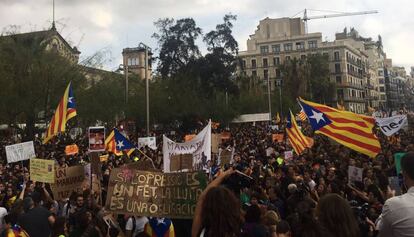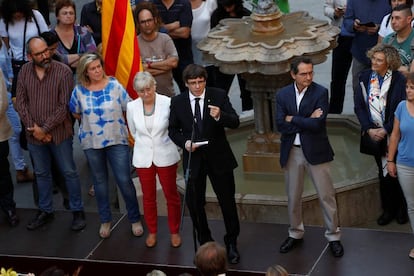Thousands of students march in Barcelona to defend Sunday referendum
Catalan police will not block access to voting stations if there is risk of street unrest

Thousands of university and high school students marched in Barcelona and other Catalan cities on Thursday in favor of the independence referendum that the regional government is planning to hold on Sunday despite a court ban over its unconstitutionality.
Around 16,000 people, according to the local police, participated in the Barcelona march, which took place on the Catalan capital’s Gran Vía thoroughfare. The demonstration was set against a series of student strikes that began on Wednesday in the lead-up to the Sunday vote, which has been suspended by the Constitutional Court.
Regional Premier Carles Puigdemont made a public appearance alongside pro-independence members of the education community on Thursday afternoon, telling the crowds that freedom of expression cannot be renounced, and that the vote will be held.

High school principals and teachers cried out "We will open them!" in reference to the voting centers, and handed Puigdemont keys to their schools in a symbolic show of support.
The Catalan government has vowed to hold the vote despite a judicial crackdown against its logistics.
Schoolchildren have also been seen on the streets attending marches and putting up pro-independence signs during regular class hours, prompting state prosecutors to remind school principals that they have a custodial obligation towards their students, and that if the latter cause damage to themselves or third parties, both the parents and the schools will be held liable.
The Education Ministry has also denounced that some children have been taken along to these marches “without prior parental authorization, or a note for the principal.”
Mossos will see how it goes
The Catalan regional police, the Mossos d'Esquadra, have been instructed to seal off access to the centers that will presumably act as voting stations on Sunday. But on Thursday, Catalan officials warned that the Mossos will put public order ahead of any court orders to block off the voting centers.
“We are neither denying nor ignoring what a judge said, but we want to make it clear that the main thing is safeguarding the peace,” said Joaquim Forn, the Catalan chief of internal affairs, at a news conference.
Schoolchildren have been seen on the streets attending marches and putting up pro-independence signs during regular class hours
Forn did not disclose which specific conditions would prevent the Mossos from performing their court-ordered duties of sealing off polling stations. Instead, he insisted that officers will apply the principles of proportionality, congruence and opportunity.
“One cannot generate bigger problems than the ones one is meant to avoid,” he said.
The Mossos police force has lately been in the spotlight for dragging its feet on the issue of halting referendum preparations.
No violence?
“There does not need to be a violent response from anybody and I trust that it will be so,” said the Spanish state secretary for security, José Antonio Nieto, at the close of a security meeting called by the Catalan government.
Interior Ministry sources underscored the need to “convey a message of calm to the Catalan people, and confidence in the full applicability of the rule of law in Catalonia, in the same conditions as in other parts of Spain.”
Five unions representing the Spanish National Police gave a news conference in Barcelona to stress that their own role is “as defenders of the law” and to enforce judges’ decisions. “We have come here to defend the law, not to use our batons.”
But the Spanish Interior Ministry has been deploying around 5,000 police officers to Catalonia to prevent any acts of violence over the weekend. And Madrid has also expressed concern about the possible arrival of radical activists from other parts of Europe, and has asked several European governments for assistance identifying and intercepting members of anarchist and anti-establishment groups.
One of the Spanish executive’s chief concerns is avoiding serious street unrest on the streets of Catalonia on October 1.
A European conflict?
On Thursday, Barcelona's leftist mayor, Ada Colau, published an opinion piece in The Guardian asking the European Commission to mediate between the Spanish and Catalan governments "to protect the rights and freedoms of Catalans."
And Reporters Without Borders published a new report denouncing pressure against journalists who write critically about the independence movement. "The continuous pressure by the Catalan government on the foreign and local press, harassment by cyberhooligans against critical reporters, and intimidation by crowds of demonstrators against television reporters has created a toxic climate for freedom of the press," said RWB.
English version by Susana Urra.
Tu suscripción se está usando en otro dispositivo
¿Quieres añadir otro usuario a tu suscripción?
Si continúas leyendo en este dispositivo, no se podrá leer en el otro.
FlechaTu suscripción se está usando en otro dispositivo y solo puedes acceder a EL PAÍS desde un dispositivo a la vez.
Si quieres compartir tu cuenta, cambia tu suscripción a la modalidad Premium, así podrás añadir otro usuario. Cada uno accederá con su propia cuenta de email, lo que os permitirá personalizar vuestra experiencia en EL PAÍS.
¿Tienes una suscripción de empresa? Accede aquí para contratar más cuentas.
En el caso de no saber quién está usando tu cuenta, te recomendamos cambiar tu contraseña aquí.
Si decides continuar compartiendo tu cuenta, este mensaje se mostrará en tu dispositivo y en el de la otra persona que está usando tu cuenta de forma indefinida, afectando a tu experiencia de lectura. Puedes consultar aquí los términos y condiciones de la suscripción digital.








































